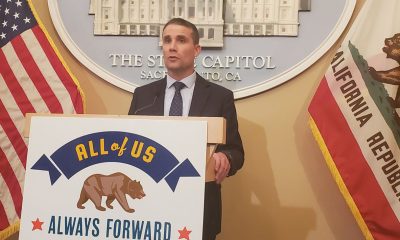Business
Good News for Some of Us: Other People are Quitting Jobs

In this Jan. 29, 2015 file photo, Tyler Kelly, 19, left, fills out applications for parking enforcement and environmental compliance jobs during a public safety job fair at City Hall in Saginaw, Mich. The Labor Department releases job openings and labor turnover survey for January on Tuesday, March 10, 2015. (AP Photo/The Saginaw News, David C. Bristow)
CHRISTOPHER S. RUGABER, AP Economics Writer
WASHINGTON (AP) — Quitting your job — all but unheard of during and after the Great Recession — is becoming more common again. That could mean pay raises are coming for more Americans.
The trend has already emerged in the restaurant and retail industries, where quits and pay are rising faster than in the overall economy. Workers in those industries appear to be taking advantage of rising consumer demand to seek better pay elsewhere.
Workers who quit typically do so to take higher-paying jobs. That’s why rising numbers of quits typically signal confidence in the economy and the job market. As the trend takes hold, employers are often forced to offer higher pay to hold on to their staffers or attract new ones.
The Labor Department said Tuesday that the number of people who quit jobs rose 3 percent from December to January to 2.8 million — the most in more than six years. Quits have jumped 17 percent over the past 12 months.
Since the Great Recession ended, the figure has soared. Just 1.6 million people quit their jobs in August 2009, two months after the recession officially ended. That was the fewest for any month in the 14 years that the figures have been tracked.
Quits tend to open up more jobs for the unemployed. One barrier for the jobless in a weak economy is that few workers risk quitting their jobs to take a different one, in part because new hires are often most likely to be laid off.
So most workers stay put, leaving fewer options for college graduates, people recently laid off and others seeking work.
The rising number of quits has begun to affect many larger corporations. Frank Friedman, interim CEO at the consulting and auditing firm Deloitte, says his firm’s clients, which include about 80 percent of the Fortune 500, are increasingly struggling to retain employees.
“The biggest problem for many businesses is talent retention,” Friedman said. “Wages are a critical component of it. The balance of power has changed in favor of the employee.”
Deloitte itself faces the same challenges. It’s stepping up its hiring, in part because more of its employees have left for other jobs.
The firm plans to add 24,000 people this year, including paid internships, to its staff of 72,000. That’s up from the past several years, when Deloitte typically hired 19,000 to 21,000 people, and the increase is largely to make up for more quits.
The same trend is squeezing the restaurant and hotel industries. Nearly half their workers quit last year, up from about one-third in 2010. And average hourly earnings for restaurant employees rose 3.4 percent in January compared with 12 months earlier, before adjusting for inflation. That’s much better than the national average of 2.2 percent, which was barely above inflation.
About one-third of U.S. retail workers quit last year, up from one-quarter in 2010. And pay rose 3.2 percent in January from the previous year.
Individual retailers, including Wal-Mart, the Gap, and TJX Cos., which owns T.J. Maxx and Marshalls, have announced pay raises in recent weeks
Not surprisingly, quit rates are much lower in higher-paying industries. Just 12 percent of manufacturing workers and 14.8 percent of financial services employees left work last year. The quit rate in government was just 7.7 percent.
Mark Zandi, chief economist at Moody’s Analytics, said that data from payroll processor ADP showed that workers who switched jobs in the final three months of 2014 received average pay increases of nearly 14 percent compared with their previous jobs. For those who remained in the same job for a year, pay rose an average 3.2 percent, before adjusting for inflation.
(Moody’s and ADP work together to compile measures of hiring and wages.)
For the economy as a whole, significant pay gains remain rare. Average hourly earnings rose just 2 percent in February from 12 months earlier, about the same weak pace of the past five years. Many economists expect those gains to pick up by year’s end as the U.S. unemployment rate, now 5.5 percent, falls further.
Some other data in the Labor Department’s release Tuesday:
— The number of open jobs rose 2.5 percent in January to nearly 5 million, the most in 14 years. That’s a sign that the robust hiring of the past 12 months should continue. Openings are typically followed by job gains, though many employers have been slow to fill their available jobs.
— Total hiring actually slowed in January, to fewer than 5 million, after reaching 5.2 million, a seven-year high, in December. Those figures reflect everyone hired in that month. By contrast, the job gains in the government’s monthly employment reports are a net figure: Jobs gained minus jobs lost.
— There were, on average, just 1.8 unemployed people for every open job in January. That ratio is typical of a healthy economy and down from a record high of nearly 7 to 1 in July 2009. The drop in competition for each job could nudge employers to raise pay.
Copyright 2015 The Associated Press. All rights reserved. This material may not be published, broadcast, rewritten or redistributed.
Activism
Oakland Post: Week of April 24 – 30, 2024
The printed Weekly Edition of the Oakland Post: Week of April 24 – 30, 2024

To enlarge your view of this issue, use the slider, magnifying glass icon or full page icon in the lower right corner of the browser window. ![]()
Bay Area
State Controller Malia Cohen Keynote Speaker at S.F. Wealth Conference
California State Controller Malia Cohen delivered the keynote speech to over 50 business women at the Black Wealth Brunch held on March 28 at the War Memorial and Performing Arts Center at 301 Van Ness Ave. in San Francisco. The Enterprising Women Networking SF Chapter of the American Business Women’s Association (ABWA) hosted the Green Room event to launch its platform designed to close the racial wealth gap in Black and Brown communities.

By Carla Thomas
California State Controller Malia Cohen delivered the keynote speech to over 50 business women at the Black Wealth Brunch held on March 28 at the War Memorial and Performing Arts Center at 301 Van Ness Ave. in San Francisco.
The Enterprising Women Networking SF Chapter of the American Business Women’s Association (ABWA) hosted the Green Room event to launch its platform designed to close the racial wealth gap in Black and Brown communities.
“Our goal is to educate Black and Brown families in the masses about financial wellness, wealth building, and how to protect and preserve wealth,” said ABWA San Francisco Chapter President LaRonda Smith.
ABWA’s mission is to bring together businesswomen of diverse occupations and provide opportunities for them to help themselves and others grow personally and professionally through leadership, education, networking support, and national recognition.
“This day is about recognizing influential women, hearing from an accomplished woman as our keynote speaker and allowing women to come together as powerful people,” said ABWA SF Chapter Vice President Velma Landers.
More than 60 attendees dined on the culinary delights of Chef Sharon Lee of The Spot catering, which included a full soul food brunch of skewered shrimp, chicken, blackened salmon, and mac and cheese.
Cohen discussed the many economic disparities women and people of color face. From pay equity to financial literacy, Cohen shared not only statistics, but was excited about a new solution in motion which entailed partnering with Californians for Financial Education.
“I want everyone to reach their full potential,” she said. “Just a few weeks ago in Sacramento, I partnered with an organization, Californians for Financial Education.
“We gathered 990 signatures and submitted it to the [California] Secretary of State to get an initiative on the ballot that guarantees personal finance courses for every public school kid in the state of California.
“Every California student deserves an equal opportunity to learn about filing taxes, interest rates, budgets, and understanding the impact of credit scores. The way we begin to do that is to teach it,” Cohen said.
By equipping students with information, Cohen hopes to close the financial wealth gap, and give everyone an opportunity to reach their full financial potential. “They have to first be equipped with the information and education is the key. Then all we need are opportunities to step into spaces and places of power.”
Cohen went on to share that in her own upbringing, she was not guided on financial principles that could jump start her finances. “Communities of color don’t have the same information and I don’t know about you, but I did not grow up listening to my parents discussing their assets, their investments, and diversifying their portfolio. This is the kind of nomenclature and language we are trying to introduce to our future generations so we can pivot from a life of poverty so we can pivot away and never return to poverty.”
Cohen urged audience members to pass the initiative on the November 2024 ballot.
“When we come together as women, uplift women, and support women, we all win. By networking and learning together, we can continue to build generational wealth,” said Landers. “Passing a powerful initiative will ensure the next generation of California students will be empowered to make more informed financial decisions, decisions that will last them a lifetime.”
Business
Black Business Summit Focuses on Equity, Access and Data
The California African American Chamber of Commerce hosted its second annual “State of the California African American Economy Summit,” with the aim of bolstering Black economic influence through education and fellowship. Held Jan. 24 to Jan. 25 at the Westin Los Angeles Airport Hotel, the convention brought together some of the most influential Black business leaders, policy makers and economic thinkers in the state. The discussions focused on a wide range of economic topics pertinent to California’s African American business community, including policy, government contracts, and equity, and more.

By Solomon O. Smith, California Black Media
The California African American Chamber of Commerce hosted its second annual “State of the California African American Economy Summit,” with the aim of bolstering Black economic influence through education and fellowship.
Held Jan. 24 to Jan. 25 at the Westin Los Angeles Airport Hotel, the convention brought together some of the most influential Black business leaders, policy makers and economic thinkers in the state. The discussions focused on a wide range of economic topics pertinent to California’s African American business community, including policy, government contracts, and equity, and more.
Toks Omishakin, Secretary of the California State Transportation Agency (CALSTA) was a guest at the event. He told attendees about his department’s efforts to increase access for Black business owners.
“One thing I’m taking away from this for sure is we’re going to have to do a better job of connecting through your chambers of all these opportunities of billions of dollars that are coming down the pike. I’m honestly disappointed that people don’t know, so we’ll do better,” said Omishakin.
Lueathel Seawood, the president of the African American Chamber of Commerce of San Joaquin County, expressed frustration with obtaining federal contracts for small businesses, and completing the process. She observed that once a small business was certified as DBE, a Disadvantaged Business Enterprises, there was little help getting to the next step.
Omishakin admitted there is more work to be done to help them complete the process and include them in upcoming projects. However, the high-speed rail system expansion by the California High-Speed Rail Authority has set a goal of 30% participation from small businesses — only 10 percent is set aside for DBE.
The importance of Diversity, Equity and Inclusion (DEI) in economics was reinforced during the “State of the California Economy” talk led by author and economist Julianne Malveaux, and Anthony Asadullah Samad, Executive Director of the Mervyn Dymally African American Political and Economic Institute (MDAAPEI) at California State University, Dominguez Hills.
Assaults on DEI disproportionately affect women of color and Black women, according to Malveaux. When asked what role the loss of DEI might serve in economics, she suggested a more sinister purpose.
“The genesis of all this is anti-blackness. So, your question about how this fits into the economy is economic exclusion, that essentially has been promoted as public policy,” said Malveaux.
The most anticipated speaker at the event was Janice Bryant Howroyd known affectionately to her peers as “JBH.” She is one of the first Black women to run and own a multi-billion-dollar company. Her company ActOne Group, is one of the largest, and most recognized, hiring, staffing and human resources firms in the world. She is the author of “Acting Up” and has a profile on Forbes.
Chairman of the board of directors of the California African American Chamber of Commerce, Timothy Alan Simon, a lawyer and the first Black Appointments Secretary in the Office of the Governor of California, moderated. They discussed the state of Black entrepreneurship in the country and Howroyd gave advice to other business owners.
“We look to inspire and educate,” said Howroyd. “Inspiration is great but when I’ve got people’s attention, I want to teach them something.”
-

 Community2 weeks ago
Community2 weeks agoFinancial Assistance Bill for Descendants of Enslaved Persons to Help Them Purchase, Own, or Maintain a Home
-

 Activism4 weeks ago
Activism4 weeks agoOakland Post: Week of April 3 – 6, 2024
-

 Business2 weeks ago
Business2 weeks agoV.P. Kamala Harris: Americans With Criminal Records Will Soon Be Eligible for SBA Loans
-

 Community2 weeks ago
Community2 weeks agoAG Bonta Says Oakland School Leaders Should Comply with State Laws to Avoid ‘Disparate Harm’ When Closing or Merging Schools
-

 Activism3 weeks ago
Activism3 weeks agoOakland Post: Week of April 10 – 16, 2024
-

 Community2 weeks ago
Community2 weeks agoOakland WNBA Player to be Inducted Into Hall of Fame
-

 Community2 weeks ago
Community2 weeks agoRichmond Nonprofit Helps Ex-Felons Get Back on Their Feet
-

 Community2 weeks ago
Community2 weeks agoRPAL to Rename Technology Center for Retired Police Captain Arthur Lee Johnson






















































